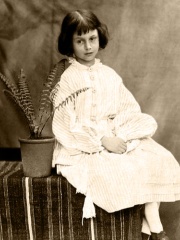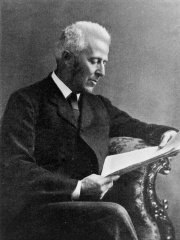


The Most Famous
INSPIRATIONS from United Kingdom
This page contains a list of the greatest British Inspirations. The pantheon dataset contains 10 Inspirations, 3 of which were born in United Kingdom. This makes United Kingdom the birth place of the most number of Inspirations.
Top 3
The following people are considered by Pantheon to be the most legendary British Inspirations of all time. This list of famous British Inspirations is sorted by HPI (Historical Popularity Index), a metric that aggregates information on a biography's online popularity.

1. Alice Liddell (1852 - 1934)
With an HPI of 68.87, Alice Liddell is the most famous British Inspiration. Her biography has been translated into 36 different languages on wikipedia.
Alice Pleasance Hargreaves (née Liddell, ; 4 May 1852 – 16 November 1934) was an English woman who, in her childhood, was an acquaintance and photographic subject of Lewis Carroll. One of the stories he told her during a boating trip became the classic 1865 children's novel Alice's Adventures in Wonderland. She shared her name with "Alice", the story's protagonist, but scholars disagree about the extent to which the character was based upon her.

2. Joseph Bell (1837 - 1911)
With an HPI of 65.64, Joseph Bell is the 2nd most famous British Inspiration. His biography has been translated into 26 different languages.
Joseph Bell FRCSE (2 December 1837 – 4 October 1911) was a Scottish surgeon and lecturer at the medical school of the University of Edinburgh in the 19th century. He is best known as an inspiration for the literary character Sherlock Holmes.

3. Andrew Wakefield (b. 1957)
With an HPI of 54.25, Andrew Wakefield is the 3rd most famous British Inspiration. His biography has been translated into 34 different languages.
Andrew Jeremy Wakefield (born 3 September 1956) is an English fraudster, anti-vaccine activist, and former senior surgeon. He was struck off the medical register for "serious professional misconduct" due to his involvement in the fraudulent 1998 Lancet MMR autism study that falsely claimed a link between the measles, mumps, and rubella (MMR) vaccine and autism. The publicity surrounding the study caused a sharp decline in vaccination uptake, leading to a number of outbreaks of measles around the world and many deaths as a result. He was a surgeon on the liver transplant programme at the Royal Free Hospital in London, and became a senior lecturer and honorary consultant in experimental gastroenterology at the Royal Free and University College School of Medicine. He resigned from his positions there in 2001 "by mutual agreement", then moved to the United States. In 2004, Wakefield co-founded and began working at the Thoughtful House research centre (later renamed the Johnson Center for Child Health and Development) in Austin, Texas. He served as executive director of the centre until February 2010, when he resigned in the wake of findings against him by the British General Medical Council which had struck him off their register. He has subsequently become known for his anti-vaccination activism. Wakefield published his 1998 paper on autism in the British medical journal The Lancet, claiming to have identified a novel form of enterocolitis linked to autism. However, other researchers were unable to reproduce his findings, and a 2004 investigation by Sunday Times reporter Brian Deer identified undisclosed financial conflicts of interest on Wakefield's part. Wakefield reportedly stood to earn up to $43 million per year selling test kits. Most of Wakefield's co-authors then withdrew their support for the study's interpretations, and the General Medical Council (GMC) conducted an inquiry into allegations of misconduct against Wakefield and two former colleagues, focusing on Deer's findings. In 2010, the GMC found that Wakefield had been dishonest in his research, had acted against patients' best interests, mistreated developmentally delayed children, and had "failed in his duties as a responsible consultant". The Lancet fully retracted Wakefield's 1998 publication on the basis of the GMC's findings, noting that elements of the manuscript had been falsified and that the journal had been "deceived" by Wakefield. Three months later, Wakefield was struck off the UK medical register, in part for his deliberate falsification of research published in The Lancet. In a related legal decision, a British court held that "[t]here is now no respectable body of opinion which supports [Wakefield's] hypothesis, that MMR vaccine and autism/enterocolitis are causally linked". In 2016, Wakefield directed the anti-vaccination film Vaxxed: From Cover-Up to Catastrophe.
People
Pantheon has 3 people classified as British inspirations born between 1837 and 1957. Of these 3, 1 (33.33%) of them are still alive today. The most famous living British inspirations include Andrew Wakefield. The most famous deceased British inspirations include Alice Liddell, and Joseph Bell.

